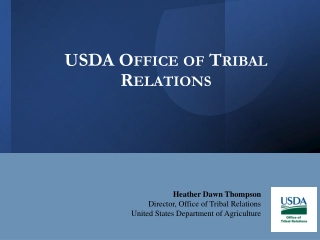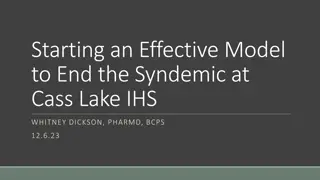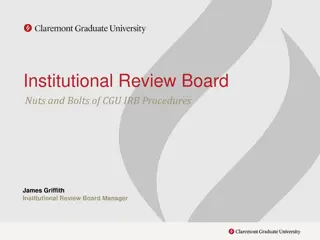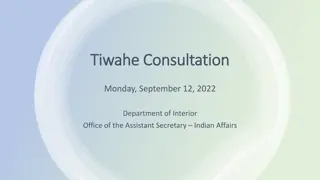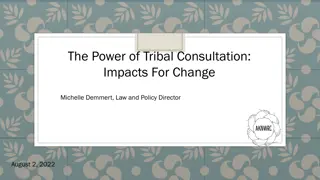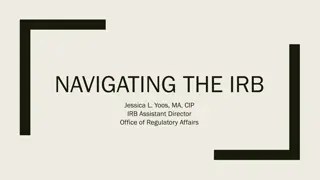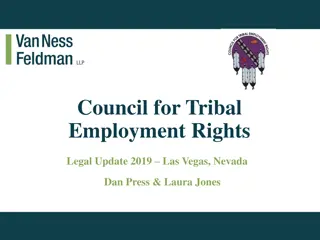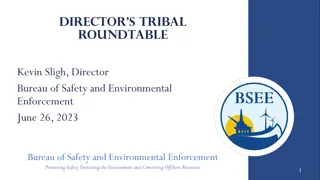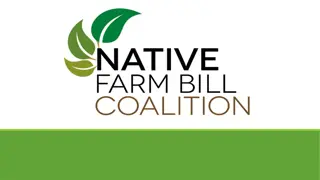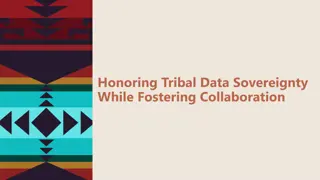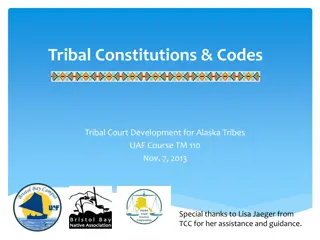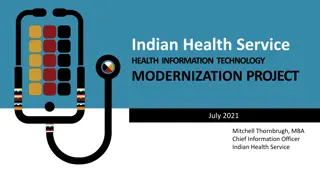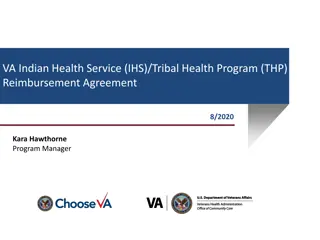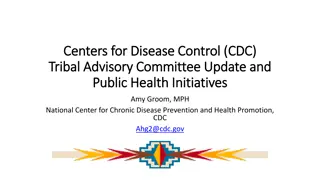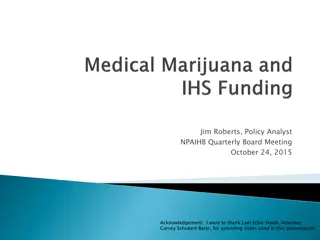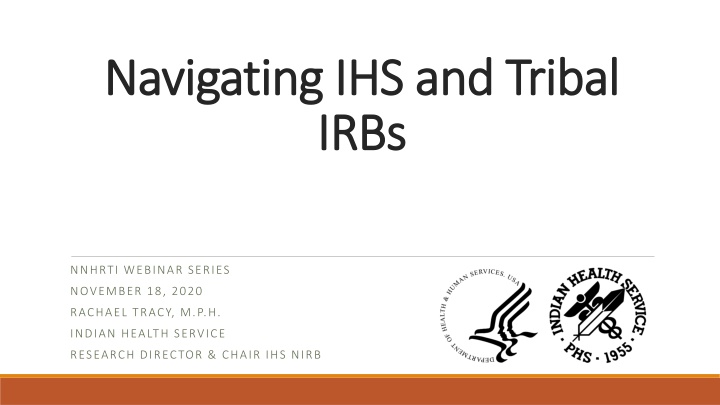
IHS and Tribal IRBs for Health Research Compliance
Explore the role of Institutional Review Boards (IRBs) within the Indian Health Service (IHS) and Tribal facilities to ensure ethical research practices for American Indians and Alaska Natives. Learn about human subject research protections, the Common Rule, and the mission of the IHS Research Program.
Download Presentation

Please find below an Image/Link to download the presentation.
The content on the website is provided AS IS for your information and personal use only. It may not be sold, licensed, or shared on other websites without obtaining consent from the author. If you encounter any issues during the download, it is possible that the publisher has removed the file from their server.
You are allowed to download the files provided on this website for personal or commercial use, subject to the condition that they are used lawfully. All files are the property of their respective owners.
The content on the website is provided AS IS for your information and personal use only. It may not be sold, licensed, or shared on other websites without obtaining consent from the author.
E N D
Presentation Transcript
Navigating Navigating IHS and Tribal IHS and Tribal IRBs IRBs NNHRTI WEBINAR SERIES NOVEMBER 18, 2020 RACHAEL TRACY, M.P.H. INDIAN HEALTH SERVICE RESEARCH DIRECTOR & CHAIR IHS NIRB
Indian Health Service Mission The Indian Health Service mission is to raise the physical, mental, social and spiritual health of American Indians and Alaska Natives to the highest level. 2
IHS Research Program Mission To support national health research, including human subject research protections and research related to health problems and the delivery of care to AI/AN people. Aligns with the IHS Strategic Plan (FY 2019-2023), Goal 2, Objective 2.1, Priority 2.1.1- Improve the quality of data collected regarding health care services and program outcomes. https://www.ihs.gov/strategicplan/
Institutional Review Board Objective Institutional Review Boards (IRBs) are in place to ensure that research observes the three principles of ethics (Belmont Report): Respect for persons Beneficence (to do no harm and to maximize benefit) Justice
Basis of IRB Oversight Federal Policy for the Protection of Human Subjects, also known as the Common Rule. Code of Federal Regulations (CFR) 45 Part 46 Protections of Human Subjects. CFR 21 Parts 50 and 56 FDA (when doing research with drugs, devices, biologic, food/color additives subject to FDA regulation) Office of Human Research Protections (OHRP) Secretary s Advisory Committee on Human Research Protections (SACHRP)
Human Subjects Research Protections Human participant research conducted in IHS facilities or with IHS staff or resources must be approved by an IHS Institutional Review Board (IRB). This includes research done in Tribal or Urban facilities since IHS, Tribal, and Urban (I/T/U) sites fall under the IHS federal-wide assurance (FWA) #00008894. IHS IRBs are the only IRBs the have authority to review and approve studies that take place in federally operated sites. The FWA is the IHS Director's assurance to the DHHS Office for Human Research Protections (OHRP) that all research conducted under his/her purview will follow Title 45, Code of Federal Regulations part 46 (45 CFR 46) and the Belmont Report. Tribal and Urban facilities may obtain their own FWA with OHRP, independent of IHS. IHS encourages and will provide guidance to Tribal and Urban health programs engaging in research to obtain independent FWAs.
The Common Rule The Common Rule affirms that each tribe may have its own definition of research and its own set of research protections and laws that may have more restrictions than the Common Rule. Researchers must also receive appropriate approvals and review from the tribe throughout the process.
Single IRB The Final Rule introduced the single Institutional Review Board (sIRB) requirement for multi-site cooperative research studies as one of their measures to decrease the administrative burden on researchers and IRBs. The Final Rule revisions included two exceptions to the single IRB requirement: Exception 1: Research that is not part of the single IRB requirement is any cooperative research where local law specifically requires additional review. The Common rule clarifies that this exception includes any tribal laws passed by American Indian or Alaska Native official governing bodies. Exception 2: A supporting Common Rule federal agency or department can decide if the single IRB approval process is not appropriate for a specific research project and can require the project partners to use additional IRBs and processes.
IRB Concerns for Individuals Risks to subjects are less than minimal in relation to the anticipated benefits. Selection of subjects is equitable (esp. vulnerable populations: pregnant women, children, or prisoners) Informed consent is sought & properly documented. Data collection process & disposition clearly defined. Provisions are made to protect the privacy of individuals. People are not coerced into participating either by loss of services or huge incentives.
IRB Concern for Communities Full awareness and consent of tribal authorities within community involved. Require tribal resolution or letter of support. Including separate approval if healthcare sites are involved (i.e. Service Unit Directors, Area Directors). Ensure Tribe is not coerced into participating and understands any resource requirements (ex: staffing, funding, and facilities). Meaningful ownership and control over data Including review and input into publications while still in draft form. Ensure data collected for one study isn t used for other purposes without prior tribal approval.
Focus on Tribal Community Representative IRB s (ex: IHS and Tribal) have the best knowledge of their local community and can minimize potential harms and misunderstandings. These types of IRBs provide an extra layer of protection and often require additional steps and considerations. Tribal members and tribal communities may mistrust researchers Educating communities about the purpose/role of IRBs and support of a local IRB may encourage more people to participate in research.
Things to Consider When Applying to IHS IRBs Privacy and Confidentiality (not all inclusive but these are the big ticket items): HIPAA Privacy Act 42 CFR Part 2 Confidentiality of Substance Use Disorder Patient Records 164.514 - Other requirements relating to uses and disclosures of protected health information 21st Century Cures Act All projects planning to collect information for non-clinical purposes from groups of IHS patients should be reviewed with the appropriate IRB Chair to determine whether they are research or whether they are activities that do not fall under 45 CFR 46, such as quality assurance/improvement (QA or QI) or public health surveillance. Such non-research may still fall under requirements of HIPAA, Privacy Act, etc. To categorize activities as public heath practice or program evaluation, it will depend on your audience and usage of data.
Things to Consider (cont.) When dealing with the I/T/U Electronic Health Records and Data: Data Sharing Agreements, Data Use Agreements, MOUs, Business Associate Agreements could potentially come into play. IT Security Review OGC Review IHS Lead Statistician Review IHS Privacy Officer Review How research activities might affect patient care, staffing, resources (use of equipment), etc. Surveys OMB review
Tribal and Independent Tribal Organization IRBs/Research Oversight Entities Some tribes administer their own IRBs, ex: Cherokee Nation, Chickasaw Nation. Some tribes rely on Tribal College/University IRBs, ex: the Lummi Nation does not have their own tribal IRB, they work with the Northwest Indian College IRB for review of research taking place in their community. Some tribes rely on other independent tribal organization IRBs: Ex: Pueblos in New Mexico work with the Southwest Tribal IRB located at the Albuquerque Area Indian Health Board. Ex: California Rural Indian Health Board (CRIHB) IRB reviews research for tribes that are members of the CRIHB. Some tribes who do not have an IRB might have a research review committee (which is not an IRB) but serves a similar function. Some tribes work with their Tribal Councils and/or their Health Depts for reviews. There is quite a variety of how tribes handle review of research.
Tribal and Independent Tribal Organization IRBs/Research Oversight Entities Blackfeet Nation California Rural Indian Health Board Cherokee Nation Chickasaw Nation Choctaw Nation Muscogee Creek Nation Blackfeet Nation American Indian Health Center, Inc. College of Menominee Nation Haskell Indian Nations University Southwest Tribal IRB Oglala Sioux Tribal Research Review Board Sisseton-Wahpeton Oyate Local Research Review Board Tribal Nations Research Group Northwest Indian College About 50 known research oversight entities.
Indian Health Service IRB IHS NIRB Address and Contact: Rachael Tracy, MPH Research Director National Institutional Review Board, Chair Division of Planning, Evaluation, and Research Office of Public Health Support Indian Health Service 5600 Fishers Lane, MS 09E10D Rockville, MD 20857 301-443-2029 Rachael.tracy@ihs.gov https://www.ihs.gov/dper/research/

